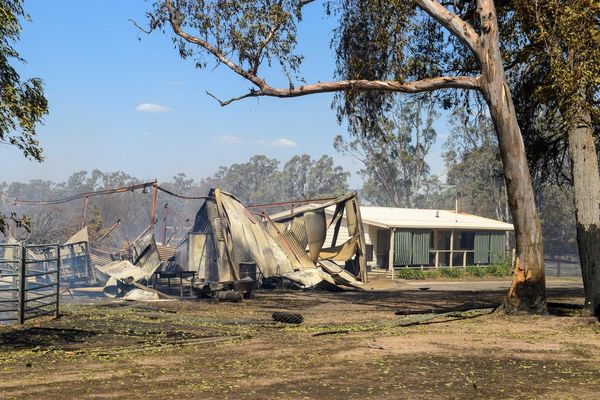
Amid the almost monochrome landscape of bare-brick buildings in the high-altitude Bolivian city of El Alto, taller structures painted in garish colours and mirrored glass stand out, topped with giant statues of pop culture figures such as Batman and Iron Man.
The extravagant structures are known as “cholets”, a blend of chalet and cholo, the term used for people of Indigenous roots who moved to urban areas while retaining their cultural traits.
These buildings once symbolised the rise of a new Aymara bourgeoisie that emerged during the commodities boom that fuelled the natural gas exports in the early years of Bolivia’s first Indigenous president, Evo Morales.
Now, however, they have become a symbol of how the leftist Movimiento al Socialismo (Mas) lost support among its base – and has gone from hegemony to the brink of obliteration.
After nearly 20 years of Mas government, the party’s presidential candidate won just 3.16% of the vote in Sunday’s election – only a whisker above the 3% threshold set by the electoral court for a party to remain eligible.
Bolivia now faces a runoff vote in October between two rightwing candidates: the senator Rodrigo Paz Pereira and former president Jorge “Tuto” Quiroga.
Meanwhile, after winning two-thirds of Congress in past elections, preliminary estimates suggest Mas will now have only one member of the lower house and no senators.
“I voted for Mas in the past, but this time I chose the right,” said Ronnyxh Oliver Mamani Figueredo, 34, an Aymara carpenter and pharmacy owner who has a seven-storey, Knights of the Zodiac-themed cholet that cost more than $1m.
Figueredo is still repaying the construction loans, but amid Bolivia’s worst economic crisis in four decades, he has been forced to cut the rental price of the building’s 400-capacity event hall from 5,000 bolivianos (£540) to 2,500 (£270).
He voted for the centre-right business tycoon Samuel Doria Medina, who ended up in third place. “The majority of cholet owners I speak to no longer support Mas,” said Figueredo.
A similar impression comes from Ramiro Sirpa, 47, a sought-after sculptor of the giant fibreglass statues that adorn the fronts of the cholets and cost between 25,000 and 60,000 bolivianos.
“The cholet owners tell me that at the start of Mas’s government, they were doing well, but in recent times it has been total disappointment,” he said.
Gonzalo Chávez Álvarez said that, even though they were seen as Mas’s natural constituency, many Indigenous businessmen were never socialists. “They always followed a popular, cutthroat capitalism,” he said. “Once Mas began to get in the way of business, the support evaporated.”
While analysts recognise the many social advances that took place under Mas, they say the causes of the party’s decline are wide-ranging and have gathered momentum over the years – particularly after Bolivia’s natural gas reserves dwindled in the final years of Morales’s presidency.
A common criticism is that the party failed to use the energy boom years to invest in other sectors, instead spending on controversial projects such as the new presidential palace, which cost $34m in 2018.
Public trust was eroded by a string of corruption scandals, environmentally controversial projects, authoritarian-style control – and above all, the recent deep economic crisis of fuel and dollar shortages and soaring inflation.
“Mas has been knocked out,” said the political analyst Daniel Valverde. “But it was the obstinate fratricidal war between Morales and [outgoing] President Luis Arce that destroyed them,” he added.
Morales sought a fourth term that was widely seen as unconstitutional in 2019. On election night, he was ahead but not by enough to win outright; after a blackout, the resumed count showed him as the winner.
The country erupted in violent protests, he resigned and fled the country.
A new election was held in 2020. Morales’s former finance minister, Arce, was chosen to stand for Mas and won.
Morales returned, but soon fell out with Arce after failing to wield the influence he wanted. The party split, and by 2023 the rupture was clear when Morales announced plans to run in this year’s elections; Arce blocked him and seized control of Mas.
In the meantime, a case that had surfaced during the 2019 campaign re-emerged: Morales was accused of fathering a child with a 15-year-old girl – an act that, under Bolivian law, constitutes statutory rape.
A prosecutor reopened the case in 2024 and issued an arrest warrant for Morales, who has since remained in the coca-growing Chapare region, shielded by hundreds of growers preventing his detention.
Asked last week why police had not enforced the warrant, Arce told the Guardian: “If the Bolivian police go ahead with the arrest, how many Bolivians will die? Is it worth many others dying for one person?”
Barred from running under another party by constitutional and electoral court rulings, Morales called on his supporters to cast blank votes, which ended up far higher than the historic average of under 5%, reaching 19%.
In Cochabamba, where the Chapare is located, blank votes reached 32.8%, more than those cast for Paz Pereira, who received 28.6%.
But in other regions where Mas had also historically prevailed, such as El Alto, Paz Pereira, a senator and the son of a former president, came out on top.
“Paz Pereira was the only candidate who reached out to deep Bolivia – artisans, small business owners, farmers, transport workers – and who tried to forge alliances with popular sectors,” said analyst Valverde, noting that in the past it was Mas that managed to connect with these groups.
“Mas risks disappearing if it doesn’t reinvent itself and make the mea culpa it has long resisted,” he added.







